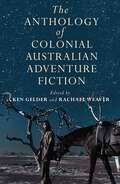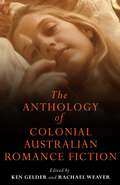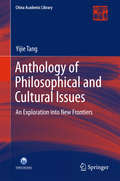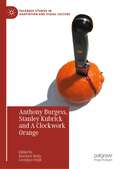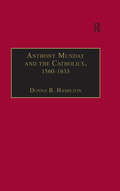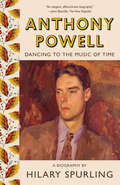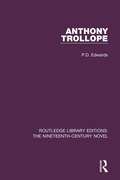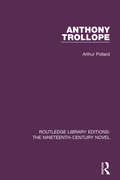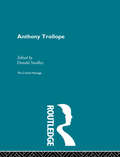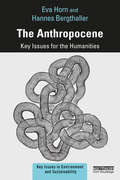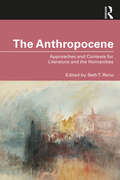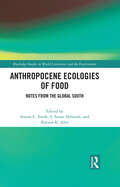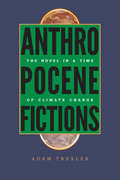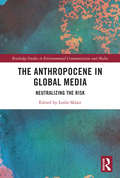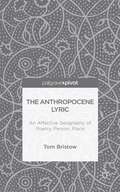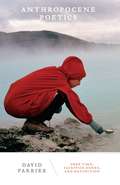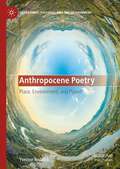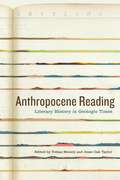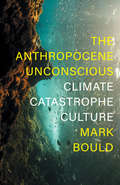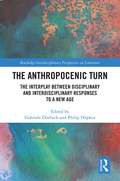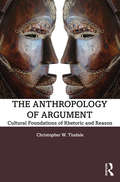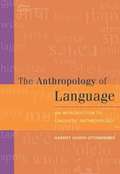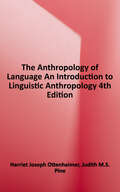- Table View
- List View
Anthology Of Colonial Australian Adventure Fiction
by Ken Gelder Rachael WeaverMarauding bushrangers, lost explorers, mad shepherds, new chums and mounted troopers: these are some of the characters who populate the often perilous world of colonial Australian adventure fiction. Squatters defend their hard-earned properties from attack, while floods and other natural disasters threaten to wipe any trace of settlement away. Colonial Australian adventure fiction takes its characters on a journey into remote and unfamiliar territory, often in pursuit of wealth and well-being. But these journeys are invariably fraught with danger, and everything comes at a price. This anthology collects the best examples of colonial Australian adventure fiction, with stories by Ernest Favenc, Louis Becke, Rosa Praed, Guy Boothby, and many others. Also available in this series: The Anthology of Colonial Australian Gothic Fiction The Anthology of Colonial Australian Crime Fiction The Anthology of Colonial Australian Romance Fiction
Anthology Of Colonial Australian Romance Fiction
by Ken Gelder Rachael WeaverThe Anthology of Colonial Australian Romance Fiction collects captivating stories of love and passion, longing and regret. In these tales women arriving in the New World make decisions about relationships and marriage, social conventions, finances and career—and even the future of the nation itself. The 'slim and graceful' Australian girl becomes a new character type: independent, self-possessed and full of promise. These stories also show women gaining experience about the world, and the men, around them. They are put to the test by a new life and a new place. And not every relationship works out well.The best of colonial Australian romance fiction is collected in this anthology, from writers such as Ada Cambridge, Rosa Praed, Francis Adams, Henry Lawson, Mura Leigh and many others.
Anthology of Philosophical and Cultural Issues: An exploration into new frontiers (China Academic Library)
by Yijie TangThis book argues that a general understanding of traditional Chinese philosophy can be achieved by a concise elaboration of its truth, goodness and beauty; that goodness and beauty in Chinese philosophy, combined with the integration of man and heaven, knowledge and practice, scenery and feeling, reflect a pursuit of an ideal goal in traditional Chinese philosophy characterized by the thought mode uniting man and nature. This book also discusses the anti-traditionalism of the May Fourth Movement, explaining that the true value of "sagacity theory" in traditional Chinese philosophy, especially in Neo-Confucianism in the Song and Ming dynasties, lies in its insights into universal life. In addition, existing ideas, issues, terminologies, concepts, and logic of Chinese philosophical thought were actually shaped by Western philosophy. It is necessary to be alienated from traditional status for the creation of a viable "Chinese philosophy. " "Modern Chinese philosophy" in the 1930s and 1940s was comprised of scholarly work that characteristically continued rather than followed the traditional discourse of Chinese philosophy. That is to say, in the process of studying and adapting Western philosophy, Chinese philosophers transformed Chinese philosophy from traditional to modern. In the end of the book, the author puts forward the idea of a "New Axial Age. " He emphasizes that the rejuvenation of Chinese culture we endeavor to pursue has to be deeply rooted in our mainstream culture with universal values incorporating cultures of other nations, especially the cultural essence of the West.
Anthony Burgess, Stanley Kubrick and A Clockwork Orange (Palgrave Studies in Adaptation and Visual Culture)
by Matthew Melia Georgina OrgillThis book brings together a diverse range of contemporary scholarship around both Anthony Burgess’s novel (1962) and Stanley Kubrick’s film, A Clockwork Orange (US 1971; UK 1972). This is the first book to deal with both together offering a range of groundbreaking perspectives that draw on the most up to date, contemporary archival and critical research carried out at both the Stanley Kubrick Archive, held at University of the Arts London, and the archive of the International Anthony Burgess Foundation. This landmark book marks both the 50th anniversary of Kubrick’s film and the 60th anniversary of Burgess’s novel by considering the historical, textual and philosophical connections between the two. The chapters are written by a diverse range of contributors covering such subjects as the Burgess/Kubrick relationship; Burgess’s recently discovered ‘sequel’ The Clockwork Condition; the cold war context of both texts; the history of the script; the politics of authorship; and the legacy of both—including their influence on the songwriting and personas of David Bowie!
Anthony Munday and the Catholics, 1560–1633
by Donna B. HamiltonIn this new study, Donna B. Hamilton offers a major revisionist reading of the works of Anthony Munday, one of the most prolific authors of his time, who wrote and translated in many genres, including polemical religious and political tracts, poetry, chivalric romances, history of Britain, history of London, drama, and city entertainments. Long dismissed as a hack who wrote only for money, Munday is here restored to his rightful position as an historical figure at the centre of many important political and cultural events in sixteenth- and seventeenth-century England. In Anthony Munday and the Catholics, 1560-1633, Hamilton reinterprets Munday as a writer who began his career writing on behalf of the Catholic cause and subsequently negotiated for several decades the difficult terrain of an ever-changing Catholic-Protestant cultural, religious, and political landscape. She argues that throughout his life and writing career Munday retained his Catholic sensibility and occasionally wrote dangerously on behalf of Catholics. Thus he serves as an excellent case study through which present-day scholars can come to a fuller understanding of how a person living in this turbulent time in English history - eschewing open resistance, exile or martyrdom - managed a long and prolific writing career at the centre of court, theatre, and city activities but in ways that reveal his commitment to Catholic political and religious ideology. Individual chapters in this book cover Munday's early writing, 1577-80; his writing about the trial and execution of Jesuit Edmund Campion; his writing for the stage, 1590-1602; his politically inflected translations of chivalric romance; and his writings for and about the city of London, 1604-33. Hamilton revisits and revalues the narratives told by earlier scholars about hack writers, the anti-theatrical tracts, the role of the Earl of Oxford as patron, the political-religious interests of Munday's plays, the implications of Mu
Anthony Powell: Dancing to the Music of Time
by Hilary SpurlingThe author of the award-winning, two-volume Matisse: A Life, now gives us the long-awaited, definitive biography of literary master Anthony Powell--the critic, editor, and novelist known as "the English Proust"-- that, at the same time, takes us deep into twentieth-century London literary life.Anthony Powell (1905-2000), best known for his twelve-volume comic masterpiece, A Dance to the Music of Time, was also the author of sixteen earlier novels, plays, and biographies, five memoirs, and three volumes of journals. He was a prolific literary critic and book reviewer. Between the two world wars, before making his name, he kept company with rowdy, hard-up writers and painters--and painters' models--in the London where Augustus John and Wyndham Lewis loomed large. He counted Evelyn Waugh and Henry Green among his lifelong friends, and his circle included the Sitwells, Graham Greene, George Orwell, Philip Larkin, and Kingsley Amis, among many others. Now, drawing on his letters, diaries, and interviews, Hilary Spurling--herself a longtime friend of Powell's-- has written a fresh and masterful portrait of the man, his work, and his time. Insightful, poignant, and cinematic in scope, this biography is as much a brilliant tapestry of a seminal moment in London's literary life as it is a revelation of an iconic literary figure.
Anthony Trollope: His Art And Scope (Routledge Library Editions: The Nineteenth-Century Novel #12)
by P.D. EdwardsFirst published in 1968, this book sets out to refute the idea of Trollope as a ‘mild cathedral-town novelist, describing storms in ecclesiastical tea cups’ which prevailed at the time in spite of his stature during his lifetime. The author reveals the full strength and range of Trollope’s achievement and provides an excellent introduction to further exploration of the novels. Two sections — ‘Narrative Method’ and ‘Subject-Matter’ — are used as the basis from which the author examines key themes in Trollope’s work, with instructive extracts from the novels included to illustrate these points and upon which commentary is provided. This book will be of interest to students of literature.
Anthony Trollope (Routledge Library Editions: The Nineteenth-Century Novel #32)
by Arthur PollardAnthony Trollope is perhaps best known for the group of Barsetshire novels, a rich and enduring picture of society in a small cathedral town. He also wrote a number of Irish novels and a series about political society known as the ‘Palliser novels’. First published in 1978, this introduction to Trollope’s life and work surveys all of his forty-seven novels, as well as his various miscellaneous works, and calls for a reassessment of his impressive achievement. This book will be of interest to those studying Victorian literature.
Anthony Trollope: The Critical Heritage (Critical Heritage Ser.)
by Donald SmalleyFirst Published in 1995. Routledge is an imprint of Taylor & Francis, an informa company.
The Anthropocene: Key Issues for the Humanities (Key Issues in Environment and Sustainability)
by Eva Horn Hannes BergthallerThe Anthropocene is a concept which challenges the foundations of humanities scholarship as it is traditionally understood. It calls not only for closer engagement with the natural sciences but also for a synthetic approach bringing together insights from the various subdisciplines in the humanities and social sciences which have addressed themselves to ecological questions in the past. This book is an introduction to, and structured survey of, the attempts that have been made to take the measure of the Anthropocene, and explores some of the paradigmatic problems which it raises. The difficulties of an introduction to the Anthropocene lie not only in the disciplinary breadth of the subject, but also in the rapid pace at which the surrounding debates have been, and still are, unfolding. This introduction proposes a conceptual map which, however provisionally, charts these ongoing discussions across a variety of scientific and humanistic disciplines. This book will be essential reading for students and researchers in the environmental humanities, particularly in literary and cultural studies, history, philosophy, and environmental studies.
The Anthropocene: Approaches and Contexts for Literature and the Humanities
by Seth T. RenoPerhaps no concept has become dominant in so many fields as rapidly as the Anthropocene. Meaning "The Age of Humans," the Anthropocene is the proposed name for our current geological epoch, beginning when human activities started to have a noticeable impact on Earth’s geology and ecosystems. Long embraced by the natural sciences, the Anthropocene has now become commonplace in the humanities and social sciences, where it has taken firm enough hold to engender a thoroughgoing assessment and critique. Why and how has the geological concept of the Anthropocene become important to the humanities? What new approaches and insights do the humanities offer? What narratives and critiques of the Anthropocene do the humanities produce? What does it mean to study literature of the Anthropocene? These are the central questions that this collection explores. Each chapter takes a decidedly different humanist approach to the Anthropocene, from environmental humanities to queer theory to race, illuminating the important contributions of the humanities to the myriad discourses on the Anthropocene. This volume is designed to provide concise overviews of particular approaches and texts, as well as compelling and original interventions in the study of the Anthropocene. Written in an accessible style free from disciplinary-specific jargon, many chapters focus on well-known authors and texts, making this collection especially useful to teachers developing a course on the Anthropocene and students undertaking introductory research. This collection provides truly innovative arguments regarding how and why the Anthropocene concept is important to literature and the humanities.
Anthropocene Ecologies of Food: Notes from the Global South (Routledge Studies in World Literatures and the Environment)
by Simon C EstokAnthropocene Ecologies of Food provides a detailed exploration of cross-cultural aspects of food production, culinary practices, and their ecological underpinning in culture. The authors draw connections between humans and the entire process of global food production focusing on the broad implications these processes have within the geographical and cultural context of India. Each chapter analyzes and critiques existing agricultural/food practices, and representations of aspects of food through various media (such as film, literature, and new media) as they relate to global issues generally and Indian contexts specifically, correcting the omission of analyses focused on the Global South in virtually all of the work that has been done on "Anthropocene ecologies of food." This unique volume employs an ecocritical framework that connects food with the land, in physical and virtual communities, and the book as a whole interrogates the meanings and implications of the Anthropocene itself.
Anthropocene Fictions: The Novel in a Time of Climate Change (Under the Sign of Nature: Explorations in Ecocriticism)
by Adam TrexlerSince the Industrial Revolution, humans have transformed the Earth's atmosphere, committing our planet to more extreme weather, rising sea levels, melting polar ice caps, and mass extinction. This period of observable human impact on the Earth's ecosystems has been called the Anthropocene Age. The anthropogenic climate change that has impacted the Earth has also affected our literature, but criticism of the contemporary novel has not adequately recognized the literary response to this level of environmental crisis. Ecocriticism's theories of place and planet, meanwhile, are troubled by a climate that is neither natural nor under human control. Anthropocene Fictions is the first systematic examination of the hundreds of novels that have been written about anthropogenic climate change.Drawing on climatology, the sociology and philosophy of science, geography, and environmental economics, Adam Trexler argues that the novel has become an essential tool to construct meaning in an age of climate change. The novel expands the reach of climate science beyond the laboratory or model, turning abstract predictions into subjectively tangible experiences of place, identity, and culture. Political and economic organizations are also being transformed by their struggle for sustainability. In turn, the novel has been forced to adapt to new boundaries between truth and fabrication, nature and economies, and individual choice and larger systems of natural phenomena. Anthropocene Fictions argues that new modes of inhabiting climate are of the utmost critical and political importance, when unprecedented scientific consensus has failed to lead to action. Under the Sign of Nature: Explorations in Ecocriticism
The Anthropocene in Global Media: Neutralizing the risk (Routledge Studies in Environmental Communication and Media)
by Leslie SklairThis book offers the first systematic study of how the ‘Anthropocene’ is reported in mass media globally, drawing parallels between the use (or misuse) of the term and the media’s attitude towards the associated issues of climate change and global warming. Identifying the potential dangers of the Anthropocene provides a useful path into a variety of issues that are often ignored, misrepresented, or sidelined by the media. These dangers are widely discussed in the social sciences, environmental humanities, and creative arts, and this book includes chapters on how the contributions of these disciplines are reported by the media. Our results suggest that the natural science and mass media establishments, and the business and political interests which underpin them, tend to lean towards optimistic reassurance (the ‘good’ Anthropocene), rather than pessimistic alarmist stories, in reporting the Anthropocene. In this volume, contributors explore how dangerous this ‘neutralizing’ of the Anthropocene is in undermining serious global action in the face of the potential existential risks confronting humanity. The book presents results from media in more than 100 countries in all major languages across the globe. It covers the reporting of key environmental issues, such as the impact of climate change and global warming on oceans, forests, soil, biodiversity, and the biosphere. We offer explanations for differences and similarities in how the media report the Anthropocene in different regions of the world. In doing so, the book argues that, though it is still controversial, the idea of the Anthropocene helps to concentrate minds and behaviour in confronting ongoing ecological (and Coronavirus) crises. The Anthropocene in Global Media will be of interest to students and scholars of environmental studies, media and communication studies, and the environmental humanities, and all those who are concerned about the survival of humans on planet Earth.
The Anthropocene Lyric: An Affective Geography of Poetry, Person, Place
by Tom BristowThis book takes the work of three contemporary poets-John Burnside, John Kinsella and Alice Oswald-to reveal how an environmental poetics of place is of significant relevance for the Anthropocene: a geological marker asking us to think radically of the human as one part of the more-than-human world.
Anthropocene Poetics: Deep Time, Sacrifice Zones, and Extinction (Posthumanities #50)
by David FarrierHow poetry can help us think about and live in the Anthropocene by reframing our intimate relationship with geological time The Anthropocene describes how humanity has radically intruded into deep time, the vast timescales that shape the Earth system and all life-forms that it supports. The challenge it poses—how to live in our present moment alongside deep pasts and futures—brings into sharp focus the importance of grasping the nature of our intimate relationship with geological time. In Anthropocene Poetics, David Farrier shows how contemporary poetry by Elizabeth Bishop, Seamus Heaney, Evelyn Reilly, and Christian Bök, among others, provides us with frameworks for thinking about this uncanny sense of time.Looking at a diverse array of lyric and avant-garde poetry from three interrelated perspectives—the Anthropocene and the &“material turn&” in environmental philosophy; the Plantationocene and the role of global capitalism in environmental crisis; and the emergence of multispecies ethics and extinction studies—Farrier rethinks the environmental humanities from a literary critical perspective. Anthropocene Poetics puts a concern with deep time at the center, defining a new poetics for thinking through humanity&’s role as geological agents, the devastation caused by resource extraction, and the looming extinction crisis.
Anthropocene Poetry: Place, Environment, and Planet (Literatures, Cultures, and the Environment)
by Yvonne ReddickAnthropocene Poetry: Place, Environment and Planet argues that the idea of the Anthropocene is inspiring new possibilities for poetry. It can also change the way we read and interpret poems. If environmental poetry was once viewed as linked to place, this book shows how poets are now grappling with environmental issues from the local to the planetary: climate change and the extinction crisis, nuclear weapons and waste, plastic pollution and the petroleum industry. This book intervenes in debates about culture and science, traditional poetic form and experimental ecopoetics, to show how poets are collaborating with environmental scientists and joining environmental activist movements to respond to this time of crisis. From the canonical work of Ted Hughes and Seamus Heaney, to award-winning poets Alice Oswald, Pascale Petit, Kei Miller, and Karen McCarthy Woolf, this book explores major figures from the past alongside acclaimed contemporary voices. It reveals Seamus Heaney’s support for conservation causes and Ted Hughes’s astonishingly forward-thinking research on climate change; it discusses how Pascale Petit has given poetry to Extinction Rebellion and how Karen McCarthy Woolf set sail with scientists to write about plastic pollution. This book deploys research on five poetry archives in the UK, USA and Ireland, and the author’s insider insights into the commissioning processes and collaborative methods that shaped important contemporary poetry publications. Anthropocene Poetry finds that environmental poetry is flourishing in the face of ecological devastation. Such poetry speaks of the anxieties and dilemmas of our age, and searches for paths towards resilience and resistance.
Anthropocene Reading: Literary History in Geologic Times (AnthropoScene: The SLSA Book Series #1)
by Tobias Menely Jesse Oak TaylorFew terms have garnered more attention recently in the sciences, humanities, and public sphere than the Anthropocene, the proposed epoch in which a human “signature” appears in the lithostratigraphic record. Anthropocene Reading considers the implications of this concept for literary history and critical method.Entering into conversation with geologists and geographers, this volume reinterprets the cultural past in relation to the anthropogenic transformation of the Earth system while showcasing how literary analysis may help us conceptualize this geohistorical event. The contributors examine how a range of literary texts, from The Tempest to contemporary dystopian novels to the poetry of Emily Dickinson, mediate the convergence of the social institutions, energy regimes, and planetary systems that support the reproduction of life. They explore the long-standing dialogue between imaginative literature and the earth sciences and show how scientists, novelists, and poets represent intersections of geological and human timescales, the deep past and a posthuman future, political exigency and the carbon cycle.Accessibly written and representing a range of methodological perspectives, the essays in this volume consider what it means to read literary history in the Anthropocene.Contributors include Juliana Chow, Jeffrey Jerome Cohen, Thomas H. Ford, Anne-Lise François, Noah Heringman, Matt Hooley, Stephanie LeMenager, Dana Luciano, Steve Mentz, Benjamin Morgan, Justin Neuman, Jennifer Wenzel, and Derek Woods.
Anthropocene Reading: Literary History in Geologic Times (AnthropoScene)
by Steve Mentz Dana Luciano Jeffrey Jerome Cohen Jennifer Wenzel Benjamin Morgan Thomas H. Ford Stephanie LeMenager Justin Neuman Juliana Chow Noah Heringman Matt Hooley Derek Woods Anne-Lise FrançoisFew terms have garnered more attention recently in the sciences, humanities, and public sphere than the Anthropocene, the proposed epoch in which a human “signature” appears in the lithostratigraphic record. Anthropocene Reading considers the implications of this concept for literary history and critical method.Entering into conversation with geologists and geographers, this volume reinterprets the cultural past in relation to the anthropogenic transformation of the Earth system while showcasing how literary analysis may help us conceptualize this geohistorical event. The contributors examine how a range of literary texts, from The Tempest to contemporary dystopian novels to the poetry of Emily Dickinson, mediate the convergence of the social institutions, energy regimes, and planetary systems that support the reproduction of life. They explore the long-standing dialogue between imaginative literature and the earth sciences and show how scientists, novelists, and poets represent intersections of geological and human timescales, the deep past and a posthuman future, political exigency and the carbon cycle.Accessibly written and representing a range of methodological perspectives, the essays in this volume consider what it means to read literary history in the Anthropocene.Contributors include Juliana Chow, Jeffrey Jerome Cohen, Thomas H. Ford, Anne-Lise François, Noah Heringman, Matt Hooley, Stephanie LeMenager, Dana Luciano, Steve Mentz, Benjamin Morgan, Justin Neuman, Jennifer Wenzel, and Derek Woods.
The Anthropocene Unconscious: Climate Catastrophe Culture
by Mark BouldFrom Ducks, Newburyport to zombie movies and the Fast and Furious franchise, how climate anxiety permeates our cultureThe art and literature of our time is pregnant with catastrophe, with weather and water, wildness and weirdness. The Anthropocene - the term given to this geological epoch in which humans, anthropos, are wreaking havoc on the earth - is to be found bubbling away everywhere in contemporary cultural production. Typically, discussions of how culture registers, figures and mediates climate change focus on 'climate fiction' or 'cli-fi', but The Anthropocene Unconscious is more interested in how the Anthropocene and especially anthropogenic climate destabilisation manifests in texts that are not overtly about climate change - that is, unconsciously. The Anthropocene, Mark Bould argues, constitutes the unconscious of 'the art and literature of our time'.Tracing the outlines of the Anthropocene unconscious in a range of film, television and literature - across a range of genres and with utter disregard for high-low culture distinctions - this playful and riveting book draws out some of the things that are repressed and obscured by the term 'the Anthropocene', including capital, class, imperialism, inequality, alienation, violence, commodification, patriarchy and racial formations. The Anthropocene Unconscious is about a kind of rewriting. It asks: what happens when we stop assuming that the text is not about the anthropogenic biosphere crises engulfing us? What if all the stories we tell are stories about the Anthropocene? About climate change?
The Anthropocenic Turn: The Interplay between Disciplinary and Interdisciplinary Responses to a New Age (Routledge Interdisciplinary Perspectives on Literature)
by Gabriele Dürbeck Philip HüpkesThis interdisciplinary volume discusses whether the increasing salience of the Anthropocene concept in the humanities and the social sciences constitutes an "Anthropocenic turn." The Anthropocene discourse creates novel conceptual configurations and enables scholars to re-negotiate and re-contextualize long-established paradigms, premises, theories and methodologies. These innovative constellations stimulate fresh research in many areas of thought and practice. The contributors to this volume respond to the proposition of an "Anthropocene turn" from the perspective of diverse research fields, including history of science, philosophy, environmental humanities and political science as well as literary, art and media studies. Altogether, the collection reveals to which extent the Anthropocene concept challenges deep-seated assumptions across disciplines. It invites readers to explore the wealth of scholarly perspectives on the Anthropocene as well as unexpected inter- and transdisciplinary connections.
The Anthropology of Argument: Cultural Foundations of Rhetoric and Reason
by Christopher W. TindaleThis innovative text reinvigorates argumentation studies by exploring the experience of argument across cultures, introducing an anthropological perspective into the domains of rhetoric, communication, and philosophy. The Anthropology of Argument fills an important gap in contemporary argumentation theory by shifting the focus away from the purely propositional element of arguments and onto how they emerge from the experiences of peoples with diverse backgrounds, demonstrating how argumentation can be understood as a means of expression and a gathering place of ideas and styles. Confronting the limitations of the Western tradition of logic and searching out the argumentative roles of place, orality, myth, narrative, and audience, it examines the nature of multi-modal argumentation. Tindale analyzes the impacts of colonialism on the field and addresses both optimistic and cynical assessments of contextual differences. The results have implications for our understanding of contemporary argumentative discourse in areas marked by deep disagreement, like politics, law, and social policy. The book will interest scholars and upper-level students in communication, philosophy, argumentation theory, anthropology, rhetoric, linguistics, and cultural studies.
The Anthropology of Intentions
by Alessandro DurantiHow and to what extent do people take into account the intentions of others? Alessandro Duranti sets out to answer this question, showing that the role of intentions in human interaction is variable across cultures and contexts. Through careful analysis of data collected over three decades in US and Pacific societies, Duranti demonstrates that, in some communities, social actors avoid intentional discourse, focusing on the consequences of actions rather than on their alleged original goals. In other cases, he argues, people do speculate about their own intentions or guess the intentions of others, including in some societies where it was previously assumed they avoid doing so. To account for such variation, Duranti proposes an 'intentional continuum', a concept that draws from phenomenology and the detailed analysis of face-to-face interaction. A combination of new essays and classic re-evaluations, the book draws together findings from anthropology, linguistics and philosophy to offer a penetrating account of the role of intentions in defining human action.
The Anthropology of Language: An Introduction to Linguistic Anthropology (Second Edition)
by Harriet OttenheimerOttenheimer's authoritative yet approachable introduction to the field's methodology, skills, techniques, tools, and applications emphasizes the kinds of questions that anthropologists ask about language and the kinds of questions that intrigue students. The text brings together the key areas of linguistic anthropology, addressing issues of power, race, gender, and class throughout. Further stressing the everyday relevance of the text material, Ottenheimer includes "In the Field" vignettes that draw you in to the chapter material via stories culled from her own and others' experiences, as well as "Doing Linguistic Anthropology" and "Cross-Language Miscommunication" features that describe real-life applications of text concepts.
The Anthropology of Language: An Introduction to Linguistic Anthropology
by Harriet Joseph Ottenheimer Judith M. S. PineLearn the methodology, skills, techniques, tools, and applications of Linguistic Anthropology with The Anthropology of Language: An Introduction to Linguistic Anthropology. This highly readable introductory text emphasizes the kinds of intriguing questions that anthropologists ask about language. The fourth edition brings together the key areas of linguistic anthropology, addressing issues of power, race, gender and class throughout. "In the Field" vignettes draw you into the chapter material and are culled from authors Ottenheimer and Pine's own experiences, among others. Other features--"Doing Linguistic Anthropology" and "Cross-Language iscommunication"--describe some of the real-life applications of concepts discussed in the text, helping you cement your understanding of the concepts and their relevance.
